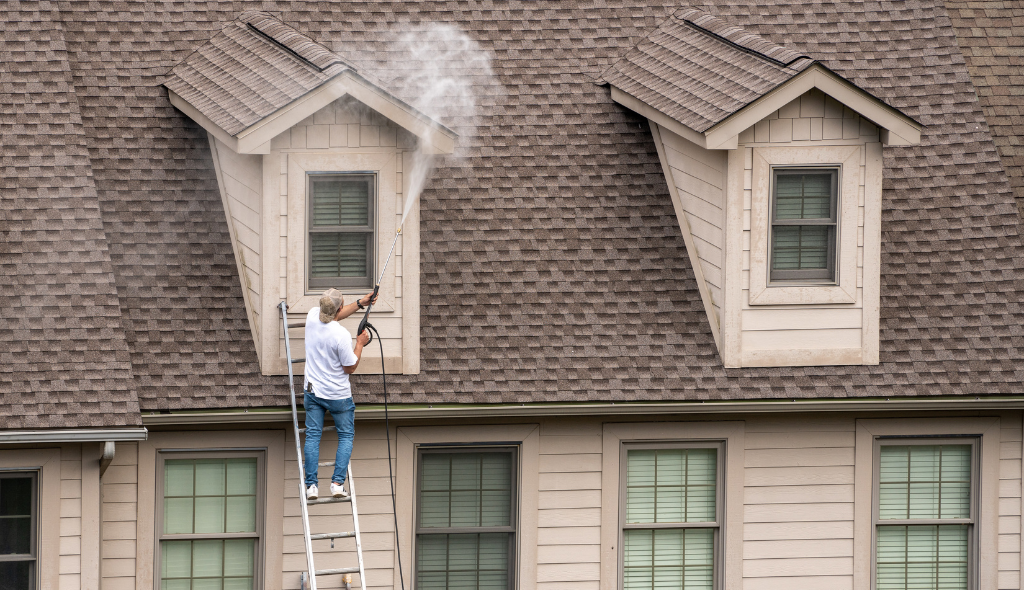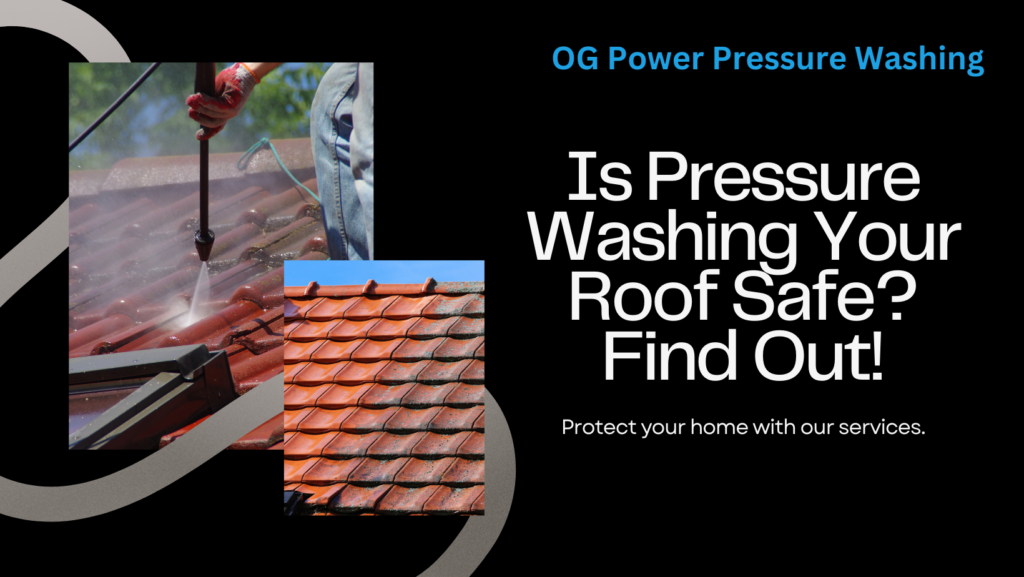In recent years, pressure washing has become a popular method for maintaining and enhancing the appearance of homes. Among the various applications, pressure washing roofs has garnered significant attention. While the practice promises to restore the aesthetic appeal of roofs by removing stains, moss, and algae, it also raises concerns about potential damage and safety.
This article aims to explore whether pressure washing your roof is a safe and effective maintenance method.
Roof Pressure Washing
Pressure washing, also known as power washing, involves the use of high-pressure water spray to remove dirt, mold, grime, and other contaminants from surfaces. A pressure washer, either electric or gas-powered, delivers water at high speeds through a nozzle, creating a powerful stream capable of cleaning various surfaces. Pressure washing roofs, in particular, can be effective for removing stubborn moss, algae, and other debris that accumulate over time.
Types of Pressure Washers
There are two main types of pressure washers: electric and gas-powered. Electric pressure washers are generally less powerful but quieter and more suitable for smaller tasks around the home. Gas-powered pressure washers, on the other hand, offer higher pressure and are often used for larger, more demanding cleaning projects, including roofs. Choosing the right type of pressure washer is crucial to ensure effective and safe cleaning.
Benefits of Pressure Washing Your Roof
Aesthetic Improvements
One of the primary benefits of pressure washing your roof is the significant aesthetic improvement it provides. Over time, roofs can become discolored and stained due to the growth of moss, algae, and lichen. These unsightly stains can detract from the overall appearance of your home. Pressure washing effectively removes these contaminants, restoring the roof’s original look and enhancing your home’s curb appeal.
Preventative Maintenance
Regular pressure washing of your roof can also serve as a form of preventative maintenance. By removing moss, algae, and other organic matter, you prevent these substances from causing further damage to your roofing materials. Moss and algae can retain moisture, leading to the deterioration of shingles and other roofing components. Regular cleaning helps extend the lifespan of your roof, saving you money on costly repairs or replacements in the long run.
Health Benefits
In addition to aesthetic and maintenance advantages, pressure washing your roof can also have health benefits. Moss, algae, and mold can contribute to poor air quality around your home and trigger allergies or respiratory issues. By eliminating these growths through pressure washing, you create a healthier living environment for you and your family.
Risks and Drawbacks of Pressure Washing Your Roof
Potential Damage to Roofing Materials
Despite its benefits, pressure washing your roof carries risks, particularly concerning the potential damage to roofing materials. High-pressure water can dislodge or break asphalt shingles, tiles, and even metal roofing. For asphalt shingles, the granules that provide protection from UV rays can be washed away, reducing the roof’s lifespan. Tiles, whether clay, concrete, or slate, can crack under the force of high-pressure water, leading to leaks and structural damage. Even metal roofs are not immune, as the high pressure can strip away protective coatings.
Water Penetration and Leaks
Another significant concern is the risk of water penetration and leaks. Improper use of a pressure washer can force water underneath shingles and into the underlying layers of the roof. This can lead to water damage, mold growth, and even structural issues if the water reaches the attic or interior spaces. Ensuring that the pressure washing is done correctly and cautiously is essential to avoid these problems.
Impact on Roof Warranty
Many roofing manufacturers provide warranties that cover defects and damage under normal use. However, using a pressure washer on your roof can void these warranties. Manufacturers often specify that harsh cleaning methods, including pressure washing, are not recommended. It’s important to check your roof’s warranty terms before deciding to pressure wash it to avoid nullifying any coverage you might have.
Safety Concerns for Homeowners
Safety is another critical consideration. Handling a pressure washer, especially on a roof, can be dangerous. The risk of slips and falls is significant, given the slippery surfaces and high-pressure equipment involved. Homeowners who are not experienced or comfortable working at heights should strongly consider hiring professional services to mitigate these risks.
Alternatives to Pressure Washing
Given the potential risks associated with pressure washing your roof, exploring alternative cleaning methods is wise.
Soft Washing
Soft washing is a gentler alternative to pressure washing. It involves using low-pressure water combined with specialized cleaning solutions to remove dirt, algae, and moss. This method is less likely to cause damage to roofing materials and is particularly effective for delicate roofs, such as those with asphalt shingles or older tiles. Soft washing provides a thorough clean without the risk of high-pressure water damage.
Chemical Treatments
Chemical treatments can also be used to clean roofs. These treatments involve applying solutions designed to kill moss, algae, and other growths. Once applied, the chemicals work to break down the organic matter, which can then be rinsed away with water. While effective, it’s important to choose chemicals that are safe for your roofing material and the environment. Professional services can ensure the correct application and minimize any potential negative impact.
Manual Cleaning Methods
For those who prefer a more hands-on approach, manual cleaning methods can be effective. Using brushes and other tools, you can physically remove moss and algae from your roof. While this method is labor-intensive and time-consuming, it eliminates the risks associated with high-pressure water. However, care must be taken to avoid damaging the roofing materials during the process.
Best Practices for Safe Roof Cleaning
Choosing the Right Cleaning Method
Selecting the appropriate cleaning method for your roof type is crucial. Asphalt shingles, tiles, and metal roofs each have unique characteristics and vulnerabilities. Consulting with roofing professionals or conducting thorough research can help you determine the best approach for your specific roof.
Hiring Professional Services
Hiring professional roof cleaning services offers several advantages. Professionals have the experience and knowledge to clean roofs safely and effectively. They are equipped with the right tools and cleaning solutions, ensuring that the job is done correctly. When choosing a professional service, look for companies with good reviews, proper licensing, and insurance coverage to protect against any accidents or damage.
DIY Tips for Safe Roof Cleaning
For those who prefer to tackle roof cleaning themselves, there are several important safety tips to keep in mind. First, always wear appropriate safety gear, including non-slip shoes, gloves, and eye protection. Use a stable ladder and secure it properly to prevent falls. When using a pressure washer, start with the lowest pressure setting and gradually increase if necessary, keeping the nozzle at a safe distance from the roof surface. Follow a systematic cleaning pattern to ensure thorough coverage without missing spots.
Success Stories of Roof Pressure Washing
Many homeowners in South Florida have successfully used pressure washing to clean their roofs and restore their homes’ appearance. For example, one homeowner reported that after pressure washing their roof, the house looked brand new, and the removal of moss and algae prevented further damage to the shingles. Another case involved a homeowner who used soft washing to clean their delicate tile roof, resulting in a spotless surface without any damage.
Incidents of Roof Damage Due to Improper Cleaning
However, there are also cautionary tales of roof damage caused by improper pressure washing. In one instance, a homeowner used a high-powered pressure washer on their asphalt shingle roof, resulting in significant granule loss and subsequent leaks. Another case involved a DIY enthusiast who, while attempting to pressure wash their roof, slipped and fell, sustaining serious injuries. These examples highlight the importance of proper technique and safety precautions.
Testimonials from Homeowners and Professionals
Homeowners who have hired professional services often express satisfaction with the results. One homeowner shared that hiring a professional roof cleaning service was the best decision, as the team was efficient, knowledgeable, and left the roof looking immaculate. Professional roof cleaners also emphasize the importance of using the right methods and tools to avoid damage and ensure long-lasting results.
To Wash or Not to Wash? The Final Verdict on Roof Pressure Washing

Pressure washing your roof can offer significant benefits, including aesthetic improvements, preventative maintenance, and health advantages. However, it also carries risks, such as potential damage to roofing materials, water penetration, and safety concerns. Exploring alternative methods like soft washing, chemical treatments, and manual cleaning can provide safer options for roof maintenance.
When considering pressure washing your roof, it’s crucial to choose the right method for your specific roof type and to prioritize safety. Hiring professional services can ensure the job is done correctly and safely. For those who prefer a DIY approach, following best practices and safety tips is essential to avoid accidents and damage.
In summary, while pressure washing your roof can be effective, it requires careful consideration and execution. By weighing the benefits and risks and choosing the appropriate method, you can maintain a clean and healthy roof without compromising its integrity or your safety.

